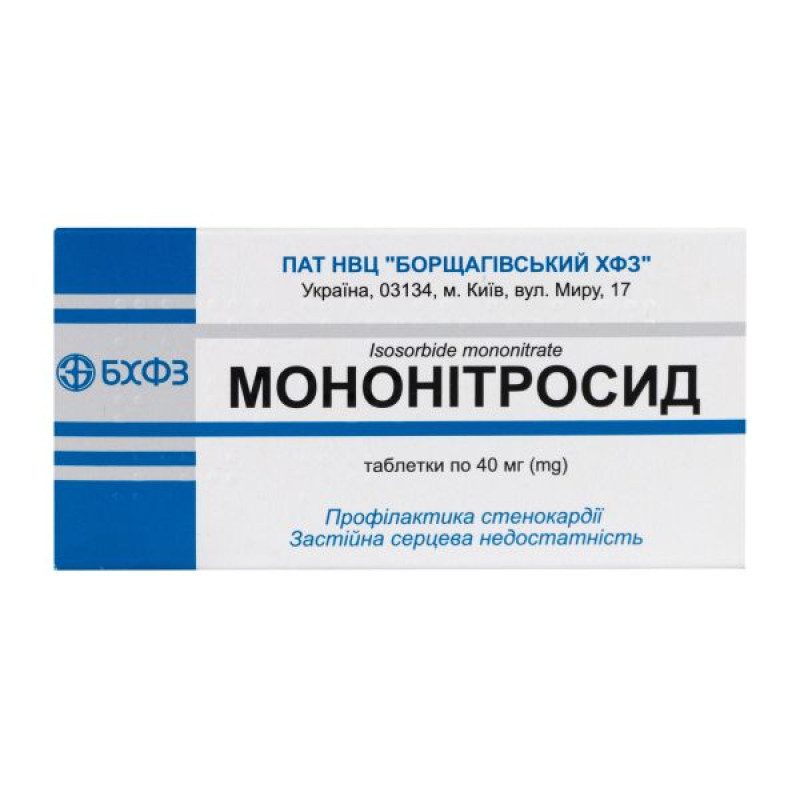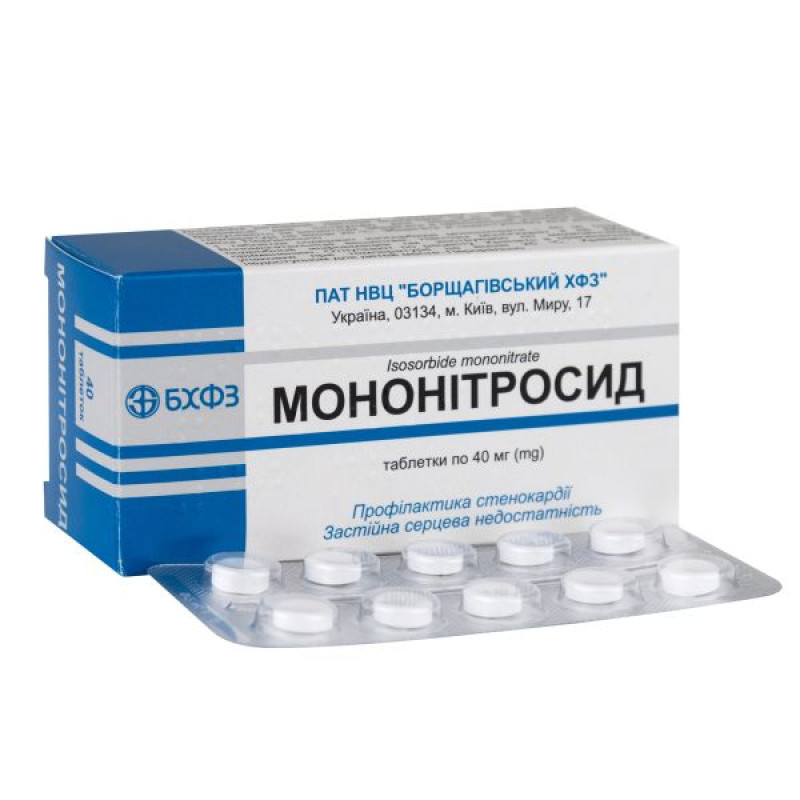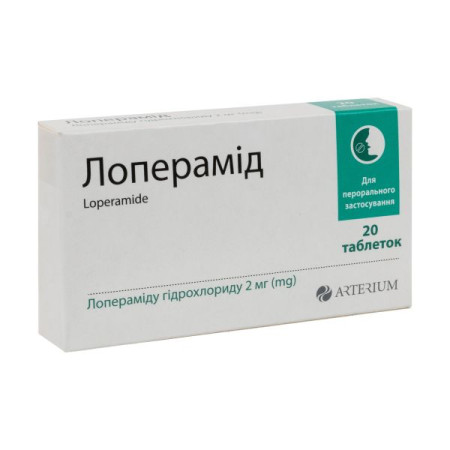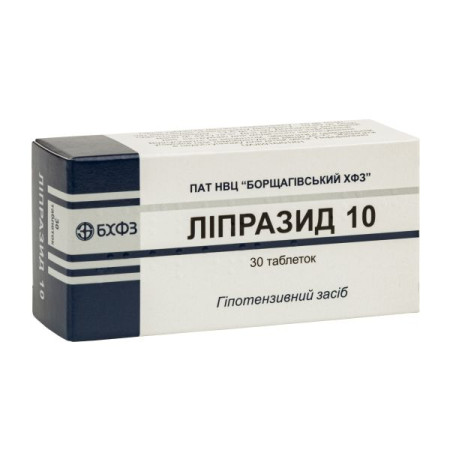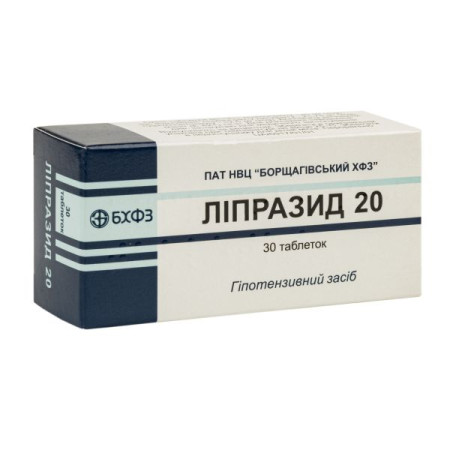Mononitroside tablets 40 mg blister No. 40
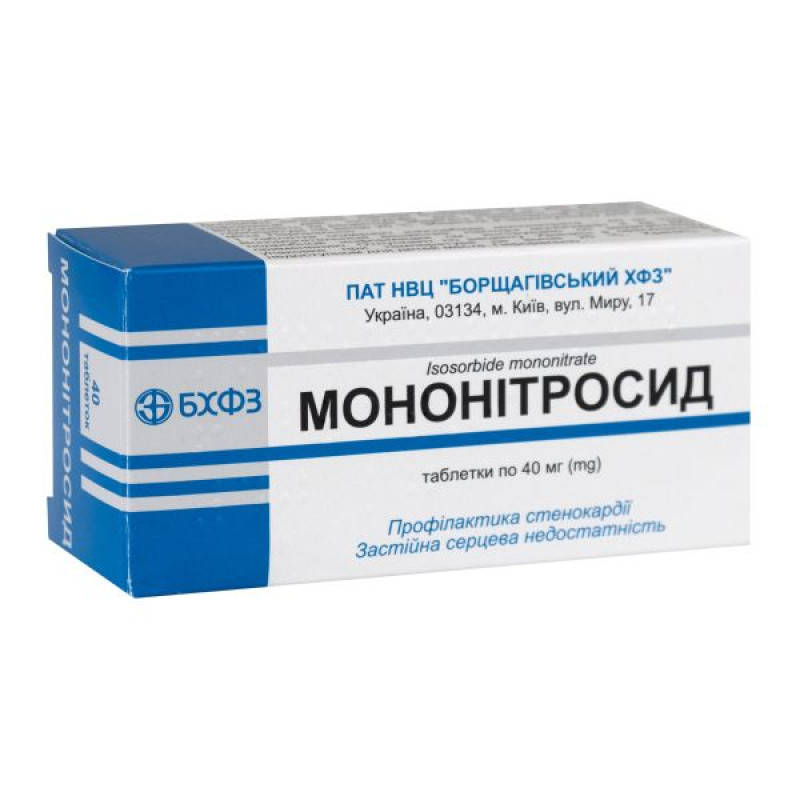
Pharmacological properties
Pharmacodynamics. Isosorbide mononitrate is a metabolite of isosorbide dinitrate, causes relaxation of vascular smooth muscle and vasodilation due to the formation of nitric oxide. The effect of isosorbide dinitrate develops faster than that of isosorbide mononitrate.
Isosorbide mononitrate simultaneously dilates peripheral veins and arteries, which leads to an increase in the capacity of venous vessels and a decrease in venous return to the heart, and, as a result, to a decrease in the end-diastolic pressure of the ventricles and preload. The effect on arterial vessels leads to a decrease in OPSS (afterload), facilitating the work of the heart. The simultaneous effect on pre- and afterload leads to a decrease in the need for myocardial oxygen. In addition, isosorbide mononitrate causes a redistribution of blood flow towards the subendocardial regions with a partial decrease in coronary blood flow due to the presence of atherosclerotic plaques. The dilation caused by nitrates improves perfusion of post-stenotic areas of the myocardium. Nitrates eliminate eccentric coronary stenosis, reducing veno-spasm. Nitrates improve hemodynamics at rest and during exercise in patients with congestive heart failure. By reducing the need for oxygen and increasing its delivery, the area of damaged myocardium is limited. Isosorbide mononitrate affects other organs and systems: it relaxes the muscles of the bronchi, gastrointestinal tract, biliary and urinary tracts. The effect of the drug develops after 20 minutes and lasts for 8 hours.
Pharmacokinetics. After oral administration of isosorbide mononitrate is completely absorbed. C max in blood plasma is reached 1 hour after administration. The drug is metabolized into inactive metabolites. Only 2% of the drug is excreted in the urine unchanged. T ½ of the drug is 4-5 hours.
Indication
Prevention of angina attacks; congestive heart failure.
Application
The drug is taken orally before meals, washed down with a sufficient amount of liquid.
The recommended dose is 40 mg (1 tablet) 2 times a day. The daily dose, depending on the severity of the disease, can reach 160 mg (maximum daily dose), divided into 3 doses.
In order to achieve maximum therapeutic effect, individual dosage of the drug is recommended depending on the patient's condition, response to the drug and tolerability. To prevent the development of tolerance to nitrates (with any dosage regimen), it is necessary to ensure a 10-12-hour nitrate-free interval (usually at night).
Hemodynamic monitoring is important for determining individual dosage.
Contraindication
Hypersensitivity to the active substance or any component of the drug; acute circulatory failure, severe arterial hypotension or hypovolemia, collapse, shock; acute myocardial infarction with low left ventricular filling pressure; severe anemia; recent traumatic brain injury or cerebral hemorrhage; glaucoma; simultaneous use with sildenafil and other phosphodiesterase inhibitors; pregnancy and breastfeeding; children's age.Side effects
At the beginning of treatment, as well as when increasing the dose of the drug, often - headache, the severity of which gradually decreases over several days, but may be severe and persistent; infrequently - motor anxiety, arterial hypotension, inattention, dizziness, drowsiness and weakness; rarely - nausea, vomiting, dilation of skin vessels with hyperemia, skin allergic reactions (rash, itching, exfoliative dermatitis).
Reflex tachycardia and symptomatic palpitations are possible as a result of the sympathomimetic effect when systemic blood pressure is reduced.
In rare cases, collapse may develop with heart rhythm disturbances and bradycardia, facial flushing, and tinnitus.
Special instructions
The drug is not used to relieve angina attacks.
It is prescribed with caution in cases of increased intracranial pressure and a tendency to arterial hypotension. During the treatment period, a decrease in the speed of psychomotor reactions is possible.
When taking the drug in high doses, methemoglobinemia may occur.
Taking isosorbide mononitrate may affect the results of colorimetric cholesterol determination.
After prolonged therapy with the drug in high doses, its withdrawal should be carried out gradually in order to prevent recurrence of angina symptoms.
If the recommended interval between doses is not observed, tolerance to nitrates may develop. Cross-tolerance to other nitrates may occur.
With prolonged use of isosorbide mononitrate and at higher doses, tolerance to the drug develops. This can be avoided by following a nitrate-free regimen.
Long-term use of nitrates in high doses leads to depletion of tissue reserves of sulfhydryl groups and can cause the development of tolerance. To prevent the development of tolerance, the introduction of sulfhydryl groups into the body is used, for example, with the help of acetylcysteine, methionine or captopril.
Use with caution in hypertrophic obstructive cardiomyopathy, constrictive pericarditis, cardiac tamponade, low cardiac filling pressure, aortic or mitral stenosis, tendency to orthostatic reactions, severe renal dysfunction, hyperthyroidism.
Children. The drug is not used in children.
Pregnancy and breastfeeding. The drug affects fetal hemodynamics, therefore it is contraindicated during pregnancy and breastfeeding.
Ability to influence the reaction speed when driving vehicles or working with other mechanisms. When using the drug, changes in the speed of psychomotor reactions and dizziness may occur, which must be taken into account when driving vehicles and working with other mechanisms.
Interactions
Phosphodiesterase inhibitors (e.g. sildenafil) potentiate the hypotensive effect of nitrates, so they should not be used simultaneously with Mononitroside.
A similar effect is also observed with the simultaneous use of nitrates with neuroleptics, vasodilators and tricyclic antidepressants.
The severity of the effects of noradrenaline, acetylcholine, and histamine decreases with simultaneous use with nitrates.
Concomitant use of Mononitroside with alcohol and antihypertensive drugs (e.g. β-adrenergic blockers, calcium antagonists, vasodilators) may enhance the hypotensive effect of the latter.
Sympathomimetics may reduce the antianginal effect of nitrates.
Nitrates may increase plasma levels of dihydroergotamine and enhance its hypertensive effect.
When used simultaneously with heparin, the antiplatelet effect is enhanced.
Overdose
When taking the drug in doses that significantly exceed therapeutic ones, the following symptoms may occur: a decrease in blood pressure to 90 mm Hg, pallor of the skin, hyperhidrosis, thready pulse, tachycardia, dizziness when standing up, headache, feeling of fear, weakness, fainting, nausea, vomiting, methemoglobinemia, seizures, visual impairment, increased intracranial pressure, cyanosis, tachypnea, shortness of breath, coma.
Treatment includes gastric lavage. The patient should be placed in a horizontal position, oxygen should be administered, and if blood pressure is low, intravenous infusion of 0.9% sodium chloride solution or blood plasma should be administered. In severe cases, dopamine and sympathomimetics are administered. In the event of methemoglobinemia, 1% methylene blue solution should be administered intravenously, mechanical ventilation should be provided, and blood transfusion should be performed if necessary. The drug is removed by hemodialysis.
Storage conditions
In the original packaging at a temperature not exceeding 25 °C.
There are no reviews for this product.
There are no reviews for this product, be the first to leave your review.
No questions about this product, be the first and ask your question.







